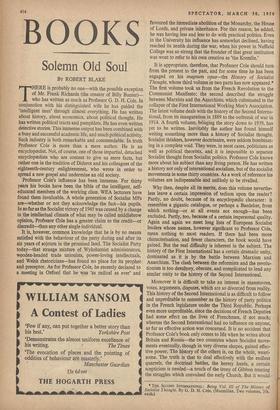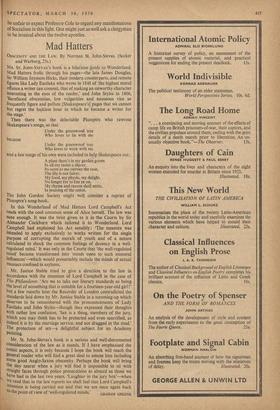BOOKS
Solemn Old Soul
BY ROBERT BLAKE THERE is probably no one—with the possible exception of Mr. Frank Richards (the creator of Billy Bunter)— who has written as much as Professor G. D. H. Cole. In conjunction with his distinguished wife he has guided the `intelligent man' through almost everything. He has written about history, about economics, about political thought. He has written political tracts and pamphlets. He has even written detective stories. This immense output has been combined with a busy and successful academic life, and much political activity. Such industry is both remarkable and commendable. In truth Professor Cole is more than a mere author. He is an encyclopaedist. Not, of course, one of those impartial, detached encyclopaedists who are content to give us mere facts, but rather one in the tradition of Diderot and his colleagues of the eighteenth-century enlightenment, who wrote in order to spread a new gospel and undermine an old society.
Professor Cole's influence has been immense. For thirty years his books have been the bible of the intelligent, self- educated members of the working class. WEA lecturers have found them invaluable. A whole generation of Socialist MPs are—whether or not they acknowledge the fact—his pupils. In so far as the Socialist victory of 1945 was caused by a change in the intellectual climate of whit may be called middlebrow opinion, Professor Cole has a greater claim to the credit—or discredit—than any other single individual.
It is, however, common knowledge that he is by no means satisfied with the behaviour of the party during and after its six years of sojourn in the promised land. The Socialist Party today—that strange mixture of Wykehamist administrators, wooden-headed trade unionists, power-loving intellectuals, and Welsh rhetoricians—has found no place for its prophet and preceptor. As for Professor Cole, he recently declared to a meeting in Oxford that ho was 'as radical as ever' and favoured the immediate abolition of the Monarchy, the House of Lords, and private inheritance. For this reason, he added, he was having less and less to do with practical politics. Even in the University his influence has somewhat declined, having reached its zenith during the war, when his power in Nuffield College was so strong that the founder of that great institution was wont to refer to his own creation as 'the Kremlin.'
It is appropriate, therefore, that Professor Cole should turn from the present to the past, and for some time he has been engaged on his magnum opus—the History of Socialist Thought, whose third volume in two parts has now appeared.* The first volume took us from the French Revolution to the Communist Manifesto; the second described the struggle between Marxists and the Anarchists; which culminated in the collapse of the First International Working Men's Association. The latest volume deals with the history of the Second Interna- tional, from its inauguration in 1889 to the outbreak of war in 1914. A fourth volume, bringing the story down to 1939, has yet to be written. Inevitably the author has found himself writing something more than a history of Socialist thought. Socialist thinkers, however doctrinaire, were seldom bombinat- ing in a complete void. They were, in most cases, politicians as well as political theorists, and it is impossible to separate Socialist thought from Socialist politics. Professor Cole knows more about his subject than any living person. He has written a history not only of international socialism, but of the socialist movements in some thirty countries. As a work of reference his volumes are indispensable and unlikely to be rivalled.
Why then, despite all its merits, does this volume neverthe- less leave a certain impression of tedium upon the reader? Partly, no doubt, because of its encyclopmclic character : it resembles a gigantic catalogue, or perhaps a Baedeker, from which nothing—or at all events not enough—has been excluded. Partly, too, because of a certain impersonal quality. Again and again we meet long lists of European Socialist leaders whose names, however significant to Professor Cole, mean nothing to most readers. If there had been more characterisation, and fewer characters, the book would have gained. But the real difficulty is inherent in the subject. The history of the First International has a certain dramatic unity, dominated as it is by the battle between Marxism and Anarchism. The clash between the reformists and the revolu- tionists is too desultory, obscure, and complicated to lend any similar unity to the history of the Second International.
Moreover it is, difficult to take an interest in manoeuvres, votes, arguments, disputes, which are so divorced from reality. This history of the Second International is as difficult to follow and unprofitable to remember as the history of party politics in the French legislature under the Third Republic. Perhaps even more unprofitable, since the decisions of French Deputies had some effect on the lives of Frenchmen, if not much: whereas the Second International had no influence on anyone, as far as effective action was concerned. It is no accident that Professor Cole's book only comes to life when he writes about Britain and Russia—the two countries where Socialist move- ments eventually, though in very diverse shapes, gained effec- tive power. The history of the others is, on the whole, weari- some. The truth is that to deal effectively with the endless quarrels, the doctrinal battles, the heresy hunts, a certain scepticism is needed—a touch of the irony of Gibbon treating the struggles which convulsed the early Church. But it would • THE SECOND INTERNATIONAL: Being Vol. 111 of The History of Socialist Thought. By G. D. H. Cole. (Macmillan. Two volumes, 35s. each.) be unfair to expect Professor Cole to regard any manifestations of Socialism in this light. Qne might just as well ask a clergyman to be ironical about the twelve apostles.



































 Previous page
Previous page